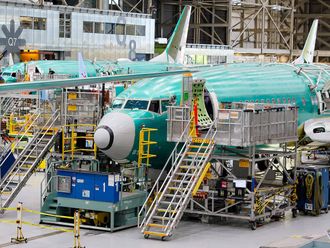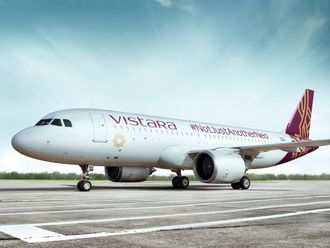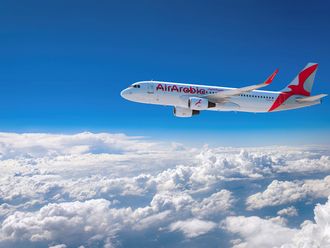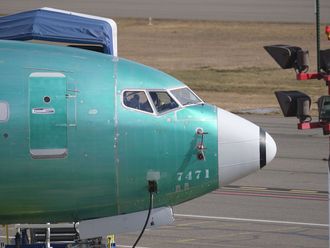Dubai: Mubadala Aerospace, a business unit of the Abu Dhabi-based Mubadala Development Company, is gearing to roll out the first UAE-manuctured aircraft by 2019, according to a senior company executive.
"We will be able to build a jet in the UAE over the next 9-10 years — 2019 is what we have set ourselves as a target. We have to build up to it gradually as we establish the MRO [maintenance, repair and overhaul] and make it globally competitive," Abdullah Shadid, chief commercial officer, Mubadala Aerospace MRO network, told Gulf News on the sidelines of the recently held MRO Middle East 2012 event.
Shadid added that Mub-adala is trying to make aerospace over the next decade "one of the most important drivers" for Abu Dhabi's economy.
"We saw MRO as a precursor into developing that. So while we started with MRO, over the last couple of years we moved into manufacturing and built that up with Strata [a composite aerostructures manufacturing facility wholly-owned by Mubadala] in Al Ain. And that becomes an immediate step to build our own aircraft," he explained.
Success story
Strata has been a remarkable success story when it comes to manufacturing aerostructures, Shadid said. "Hopefully we can continue that success story to eventually building our own aircraft," he said.
During the Dubai Airshow last November, Mubadala was introduced by US plane manufacturer Boeing as its Tier-1 supplier for aircraft parts, a deal under which Boeing Commercial Airplanes established Strata Manufacturing (Strata) facility in Al Ain, as a major Tier-1 supplier to Boeing.
Industry experts seem to be in agreement with Mubadala's goal of manufacture aircraft in the region. "I think it's possible for the UAE to start making its own aircraft. It is an important part of becoming competitive," Lida Mantzavinou, consulting analyst, commercial aviation, Frost and Sullivan, told Gulf News.
"Right now, Mubadala has Strata, which is composites manufacturer. In the near future, they will have to build an aerospace industry. But they will need to have co-operation from other MRO and aviation players in the region to be able to bring out their own jet," she said. "If you're alone, it's hard to do that — in the UAE it's only Strata focusing on that as of now."
Future growth
Commenting on the changing faces of the MRO industry in the Middle East, Mantzavinou said the MRO industry in the Middle East is on an "upward spiral" and that it is expected to reach around "$7 billion (Dh25.70 billion) by 2020". "The MRO market in the rest of the regions, such as Europe, North America, and Africa, is also going to grow but at a slower rate and smaller volumes," she said.
Other industry experts, too, project aggressive growth in the MRO industry in the region over the next decade. "The Middle East MRO market is today estimated at $3.1 billion and is projected to grow to $4.9 billion in 2021," said Tom Cooper, senior vice-president and principal, TeamSAI. He added that there is absolutely "no reason that we can' be extremely successful" with MRO in this region. "The demand is here. If you look around the Middle East, that's where all the growth is for the next ten years," he said.
According to yet another industry expert, David Stewart, vice-president — Europe, Middle East and Asia, ICF SH&E, Middle Eastern carriers generate six per cent of global MRO spend, estimated at about $3 billion.
The global MRO spend, according to Stewart, is $53 billion at present, poised to grow to $76 billion in 2021 with the average growth rate forecast to be four per cent CAGR [compounded annual growth rate].
The Middle East MRO spend is forecast to grow at 9.4 per cent CAGR, "well above the global average, driven primarily by the high rate of twin-aisle fleet growth in the region", Stewart said.
GCC carriers' share
The GCC flag airlines account for 72 per cent of Middle East MRO spend, according to ICF SH&E's Stewart, with the national carriers of the six GCC countries generating MRO spend of about $2.2 billlion per annum currently.
Further splitting the spend among the key GCC carriers, he said that "Emirates accounts for 32 per cent; Etihad Airways 8 per cent; Qatar Airways 13 per cent; Saudi Arabian Airlines 11 per cent; Gulf Air and Oman Air each 3 per cent; and Kuwait Airways 2 per cent".












